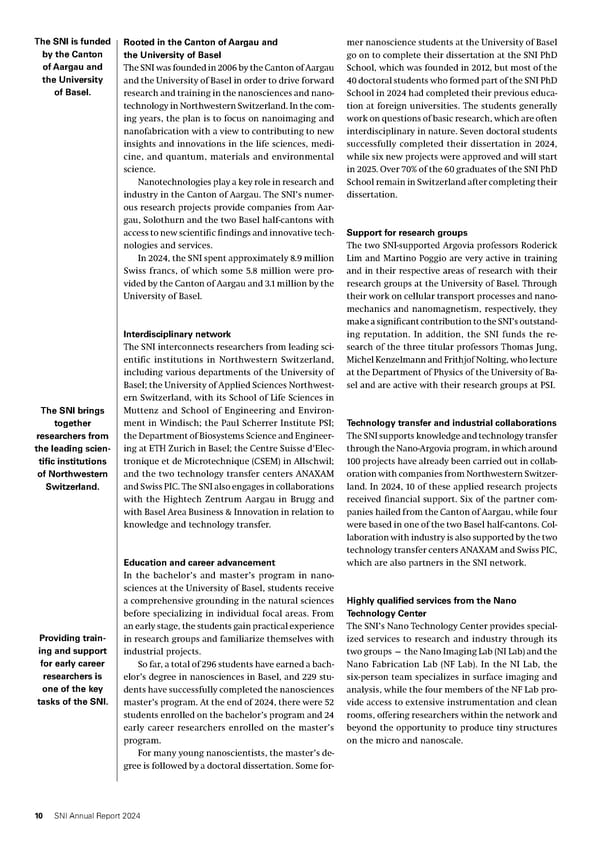The SNI is funded Rooted in the Canton of Aargau and mer nanoscience students at the University of Basel by the Canton the University of Basel go on to complete their dissertation at the SNI PhD of Aargau and The SNI was founded in 2006 by the Canton of Aargau School, which was founded in 2012, but most of the the University and the University of Basel in order to drive forward 40 doctoral students who formed part of the SNI PhD of Basel. research and training in the nanosciences and nano- School in 2024 had completed their previous educa- technology in Northwestern Switzerland. In the com- tion at foreign universities. The students generally ing years, the plan is to focus on nanoimaging and work on questions of basic research, which are often nanofabrication with a view to contributing to new interdisciplinary in nature. Seven doctoral students insights and innovations in the life sciences, medi- successfully completed their dissertation in 2024, cine, and quantum, materials and environmental while six new projects were approved and will start science. in 2025. Over 70% of the 60 graduates of the SNI PhD Nanotechnologies play a key role in research and School remain in Switzerland after completing their industry in the Canton of Aargau. The SNI’s numer- dissertation. ous research projects provide companies from Aar- gau, Solothurn and the two Basel half-cantons with access to new scientific findings and innovative tech- Support for research groups nologies and services. The two SNI-supported Argovia professors Roderick In 2024, the SNI spent approximately 8.9 million Lim and Martino Poggio are very active in training Swiss francs, of which some 5.8 million were pro- and in their respective areas of research with their vided by the Canton of Aargau and 3.1 million by the research groups at the University of Basel. Through University of Basel. their work on cellular transport processes and nano- mechanics and nanomagnetism, respectively, they make a significant contribution to the SNI’s outstand- Interdisciplinary network ing reputation. In addition, the SNI funds the re- The SNI interconnects researchers from leading sci- search of the three titular professors Thomas Jung, entific institutions in Northwestern Switzerland, Michel Kenzelmann and Frithjof Nolting, who lecture including various departments of the University of at the Department of Physics of the University of Ba- Basel; the University of Applied Sciences Northwest- sel and are active with their research groups at PSI. ern Switzerland, with its School of Life Sciences in The SNI brings Muttenz and School of Engineering and Environ- together ment in Windisch; the Paul Scherrer Institute PSI; Technology transfer and industrial collaborations researchers from the Department of Biosystems Science and Engineer- The SNI supports knowledge and technology transfer the leading scien- ing at ETH Zurich in Basel; the Centre Suisse d’Elec- through the Nano-Argovia program, in which around tific institutions tronique et de Microtechnique (CSEM) in Allschwil; 100 projects have already been carried out in collab- of Northwestern and the two technology transfer centers ANAXAM oration with companies from Northwestern Switzer- Switzerland. and Swiss PIC. The SNI also engages in collaborations land. In 2024, 10 of these applied research projects with the Hightech Zentrum Aargau in Brugg and received financial support. Six of the partner com- with Basel Area Business & Innovation in relation to panies hailed from the Canton of Aargau, while four knowledge and technology transfer. were based in one of the two Basel half-cantons. Col- laboration with industry is also supported by the two technology transfer centers ANAXAM and Swiss PIC, Education and career advancement which are also partners in the SNI network. In the bachelor’s and master’s program in nano- sciences at the University of Basel, students receive a comprehensive grounding in the natural sciences Highly qualified services from the Nano before specializing in individual focal areas. From Technology Center an early stage, the students gain practical experience The SNI’s Nano Technology Center provides special- Providing train- in research groups and familiarize themselves with ized services to research and industry through its ing and support industrial projects. two groups — the Nano Imaging Lab (NI Lab) and the for early career So far, a total of 296 students have earned a bach- Nano Fabrication Lab (NF Lab). In the NI Lab, the researchers is elor’s degree in nanosciences in Basel, and 229 stu- six-person team specializes in surface imaging and one of the key dents have successfully completed the nanosciences analysis, while the four members of the NF Lab pro- tasks of the SNI. master’s program. At the end of 2024, there were 52 vide access to extensive instrumentation and clean students enrolled on the bachelor’s program and 24 rooms, offering researchers within the network and early career researchers enrolled on the master’s beyond the opportunity to produce tiny structures program. on the micro and nanoscale. For many young nanoscientists, the master’s de- gree is followed by a doctoral dissertation. Some for- 10 SNI Annual Report 2024
 Annual Report 2024 - Swiss Nanoscience Institute Page 9 Page 11
Annual Report 2024 - Swiss Nanoscience Institute Page 9 Page 11